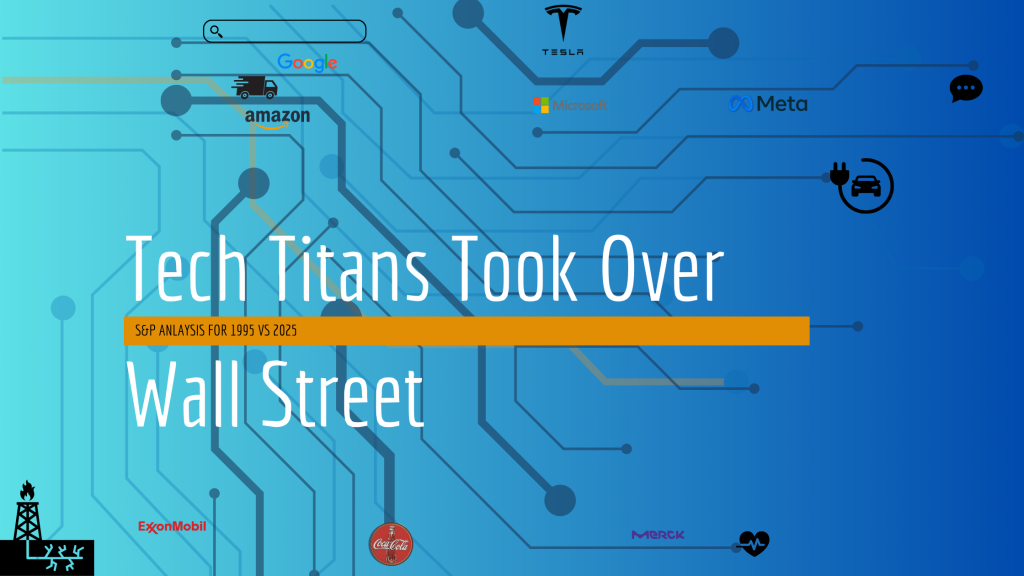The Greatest Wealth Shift of the Modern Era
In the summer of 1995, ExxonMobil’s towering headquarters in Irving, Texas, stood as a symbol of corporate dominance. The energy giant, alongside Coca-Cola, Merck, and Bank of America, reigned supreme, shaping the financial landscape of America. Their balance sheets were fortress-like, their influence unquestioned. But in the decades that followed, a seismic shift unfolded—one that would rewrite the rules of capitalism.
Fast forward to 2025, and a very different set of names dominate the financial skyline. The torch has passed from the oil barons and industrial moguls to the architects of the digital age—Apple, Microsoft, NVIDIA, and Alphabet. “We’re witnessing the most significant wealth transfer in modern history, from traditional industries to digital-first companies,” notes Harvard Business School professor Dr. Sarah Chen. “The market capitalization shifts tell a compelling story of how technology has reshaped our economy.”
The Numbers Don’t Lie: A Tale of Two Eras
The Top 7 U.S. Companies in 1995
| Rank | Company | Market Capitalization (USD, billions) | % of S&P 500 |
| 1 | Exxon Mobil | 99.96 | 1.12% |
| 2 | Coca-Cola | 93.20 | 1.04% |
| 3 | Merck | 72.95 | 0.82% |
| 4 | Bank of America | 71.61 | 0.80% |
| 5 | Raytheon | 58.06 | 0.65% |
| 6 | Procter & Gamble | 56.28 | 0.63% |
| 7 | Johnson & Johnson | 55.38 | 0.62% |
In 1995, the combined market cap of these seven corporate giants stood at roughly $507 billion—just 5.68% of the total S&P 500 valuation of $8.9 trillion. Traditional industry still ruled, and the internet was a fledgling experiment.

The Top 7 U.S. Companies in 2025
| Rank | Company | Market Capitalization (USD, trillions) | % of S&P 500 |
| 1 | Apple | 3.545 | 6.52% |
| 2 | Microsoft | 3.086 | 5.68% |
| 3 | NVIDIA | 2.941 | 5.41% |
| 4 | Alphabet (Google) | 2.517 | 4.63% |
| 5 | Amazon | 2.499 | 4.60% |
| 6 | Meta Platforms | 1.746 | 3.21% |
| 7 | Tesla | 1.301 | 2.39% |
In 2025, the story has dramatically changed. The combined valuation of the top seven companies skyrocketed to $17.685 trillion, representing a staggering 32.44% of the S&P 500. The industrial titans of the past had been dethroned by digital empires operating in data, algorithms, and artificial intelligence.

“The concentration of market wealth in technology companies has reached unprecedented levels,” observes Michael Wilson, Chief Market Strategist at Morgan Stanley. “The top three companies alone—Apple, Microsoft, and NVIDIA—now control more market value than the S&P 500 did in 1990.”
The Sectors That Defined the Digital Age
The world didn’t just transition to digital—it was completely restructured by it. The most valuable assets of the 21st century weren’t oil fields or manufacturing plants but cloud servers, artificial intelligence models, and digital ecosystems that connected billions of people across the globe.
The Communication Disruption
Once upon a time, landlines and cable TV were the backbone of communication. AT&T was the undisputed king of connectivity. But by 2025, the entire communication landscape had transformed:
- AT&T’s market share in communication services: 65% (1995) → 12% (2025)
- Google’s Gmail active users: 1.8 billion (2025)
- Microsoft Teams daily active users: 320 million (2025)
Retail: From Aisles to Algorithms
Brick-and-mortar retail didn’t just shrink—it was reinvented. Amazon’s meteoric rise altered how we think about commerce:
- E-commerce market share: Amazon controls 41% of U.S. online retail (2025)
- Amazon Prime members: 275 million worldwide (2025)
- Amazon’s global distribution centers: 1,500+ (2025)
“Traditional retail wasn’t just disrupted; it was completely reimagined,” states Dr. Rachel Martinez, Retail Analytics Director at Deloitte. “Amazon’s logistics network processes more packages daily than the entire U.S. Postal Service did in 1995.”
Automotive: The Tesla Era
Detroit once dictated the fate of the automotive industry. Not anymore. The pivot to electric vehicles (EVs) has changed everything:
- Tesla’s production output: 4.8 million vehicles (2024)
- Global EV market share: 18% (2024)
- Market cap comparison: Tesla ($1.301T) vs. General Motors ($52B) in 2025
Artificial Intelligence: The Engine of the New Economy
If software ate the world, AI is now programming its future. NVIDIA’s rise underscores AI’s growing dominance:
- Global GPU market share: 88% (2025)
- AI chip revenue: $47.8 billion (2024)
- Annual R&D investment: $18.4 billion (2024)
“AI isn’t just a new technology; it’s a fundamental shift in how value is created,” explains Jensen Huang, CEO of NVIDIA. “The companies leading this transformation are reshaping every industry they touch.”
Looking Ahead: The Next Decade of Disruption
The question is no longer if technology will dominate—it’s how much further it will go. By 2030, projections suggest:
- AI will add $13 trillion to global GDP
- 75% of companies will fully integrate AI
- Digital transformation spending will reach $2.8 trillion annually
“The shift from physical to digital assets has fundamentally altered how we measure corporate value,” notes Yale economist Dr. Robert Shiller. “The market now prizes scalable digital infrastructure over physical production capacity.”
The Bottom Line: Adapt and learn Digital technologies or Be Left Behind
The companies that ruled 1995’s economy largely failed to anticipate the digital transformation. By contrast, the firms that dominate 2025 didn’t just ride the digital wave—they created it.
“We’re still in the early stages of this digital revolution,” concludes Marc Andreessen, co-founder of Andreessen Horowitz. “The next decade will see even more dramatic shifts as AI and other emerging technologies reshape every aspect of our economy.”
Wall Street isn’t just about stocks anymore—it’s about software, data, and artificial intelligence. And in this new age, those who fail to adapt will find themselves relics of a bygone era.

